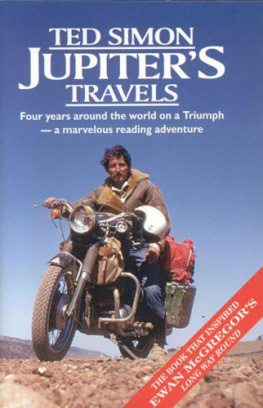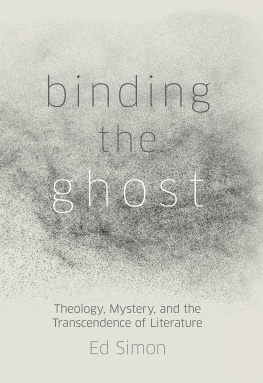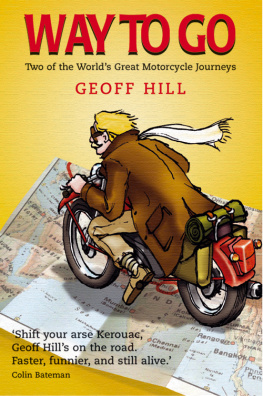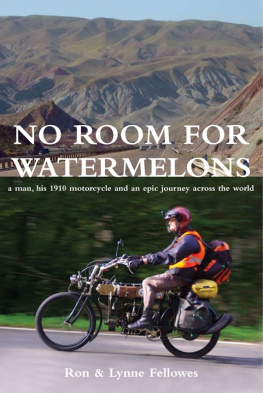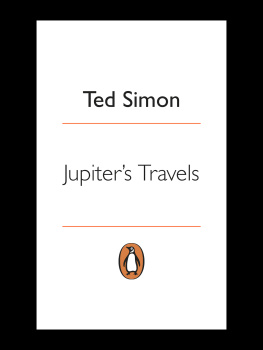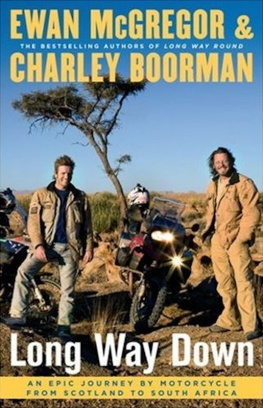Ted Simon - Dreaming Of Jupiter
Here you can read online Ted Simon - Dreaming Of Jupiter full text of the book (entire story) in english for free. Download pdf and epub, get meaning, cover and reviews about this ebook. year: 2012, publisher: Abacus, genre: Detective and thriller. Description of the work, (preface) as well as reviews are available. Best literature library LitArk.com created for fans of good reading and offers a wide selection of genres:
Romance novel
Science fiction
Adventure
Detective
Science
History
Home and family
Prose
Art
Politics
Computer
Non-fiction
Religion
Business
Children
Humor
Choose a favorite category and find really read worthwhile books. Enjoy immersion in the world of imagination, feel the emotions of the characters or learn something new for yourself, make an fascinating discovery.

- Book:Dreaming Of Jupiter
- Author:
- Publisher:Abacus
- Genre:
- Year:2012
- Rating:3 / 5
- Favourites:Add to favourites
- Your mark:
- 60
- 1
- 2
- 3
- 4
- 5
Dreaming Of Jupiter: summary, description and annotation
We offer to read an annotation, description, summary or preface (depends on what the author of the book "Dreaming Of Jupiter" wrote himself). If you haven't found the necessary information about the book — write in the comments, we will try to find it.
Ted Simon: author's other books
Who wrote Dreaming Of Jupiter? Find out the surname, the name of the author of the book and a list of all author's works by series.
Dreaming Of Jupiter — read online for free the complete book (whole text) full work
Below is the text of the book, divided by pages. System saving the place of the last page read, allows you to conveniently read the book "Dreaming Of Jupiter" online for free, without having to search again every time where you left off. Put a bookmark, and you can go to the page where you finished reading at any time.
Font size:
Interval:
Bookmark:
Ted Simon was raised in London and studied chemical engineering, but he went to Paris where he fell into journalism. He is the author of several books, including the classic Jupiters Travels. He now lives in northern California.
Jupiters Travels
Riding High
The Chequered Year
The Gypsy in Me
The River Stops Here
Published by Hachette Digital
ISBN: 978-1-40552-751-4
Copyright Ted Simon 2007
All rights reserved. No part of this publication may be reproduced, stored in a retrieval system, or transmitted, in any form or by any means, without the prior permission in writing of the publisher.
Hachette Digital
Little, Brown Book Group
100 Victoria Embankment
London, EC4Y 0DY
www.hachette.co.uk
In March of 1973 I decided to travel around the world on a motorcycle. The idea came, you could say, out of the blue, although it was a rather grey day on the south coast of England. I chose the motorcycle for two main reasons. First, it seemed like the most versatile vehicle to use. Second, because I didnt think anyone had ever done it on a bike, and being the first to do it would make for a good book.
I was a writer, not a rider. Although I had admired motorcycles since childhood, I knew nothing about them, but that didnt bother me. Millions rode them, why shouldnt I? I was forty-two years old. Some people said, Surely youre too old for this kind of thing! But that didnt bother me either, and in fact it turned out to be a good age.
The journey took four years. It was very hard, very exciting, and out of it came Jupiters Travels, a book which many people have read.
If I had been told that I would do it again at the age of seventy I would have said that was ridiculous. Seventy would be much too old for that kind of thing.
In fact, twenty-four years later, when I was sixty-nine, I thought, Why not? I can still ride a bike. Wouldnt it be fascinating to find out what had happened along that 78,000 mile trail that I invented for myself in the seventies, and to see if I could recapture, in some way, the person I was then this man who acquired briefly the rather lofty nickname of Jupiter, and who became for some an almost mythical figure.
There are thousands, I know, who dream of doing what that Jupiter did. Why shouldnt I?
The future is not what it used to be.
Paul Valry
He appears in my memory like a wraith, tantalising me, a figure with no outline, just a presence that fades as I try to focus, and revives as I avert my mind. At the time we met, thirty years ago, he was merely a curiosity and not important to me, but now, swimming up from some cranny of the unconscious, he has taken hold.
He was a deckhand on the Zo. G, the only ship I could find to carry me and my Triumph from Africa to South America. She was just a small tramp steamer, destined soon to be beached and broken up on some distant Indian shore, but she took me safely through a horrifying storm to Brazil, and for me she was a ship of dreams. I was already loaded with my own freight of memories from the journey through Africa and I was deep in thought, sifting through them and making discoveries about myself and my experiences. Perhaps I wasnt available to see him as more than a passing phenomenon. Today I see him as a presentiment. Had I paid more attention, perhaps I would have better foreseen the shape of things to come.
We were often alone together on the narrow metal deck where my bike also stood, lashed to a rail and bundled up under a canvas shroud, looking sad and inconsequential. His principal job was to repaint the ships bubbling ironwork in a valiant effort to make the old lady presentable. His face was a discordant jumble of features, a mixture of many races. This I remember only because its what I told myself at the time, and not because I can see him now. In the apartheid South Africa of the time he would have been classified as coloured. There was some Chinese in the mix, I thought, along with Indian and maybe Malay, but he was predominantly black African. He was young, barely twenty, lean, muscular, with a liking for colourful tank-tops and for conversation. We had plenty of time to talk.
Why I remember him, what struck me most particularly, was his point of view. On my way from London to Cape Town I had been collecting opinions. What did newly independent black Kenyans think? Or Tunisian Arabs? Or Afrikaaners? Or Egyptians? Or white Rhodesians? Or Sudanese Christians? Or Turkana tribesmen? Or young unemployed Libyan Muslims?
But this man I must have known his name but its lost to me saw things quite outside categories. A vivid intelligence shone through his ill-assorted features, unhampered by too much education, nourished on innumerable encounters in ports around the world. He was the Third World embodied, yet somehow he transcended it. He was a great optimist, mischievous, full of humour and insight. He stood outside the attitudes of deprivation, but he asked sharp questions. There was no chip on his shoulder, no fear in his eyes, no violence in his heart, only a clear awareness of possibilities. He had an intuitive grasp of the forces at work in the world, and seemed contemptuous of them.
I cant remember the words he used but they made a big impact on me. I had never expected to meet a man so able to liberate himself from his circumstances. However, I realise now that his true meaning escaped me. At the time I couldnt see beyond what I had only just absorbed for myself, which was a view of people throughout a continent locked into their own tribal, national and religious beliefs, and profoundly suspicious of their neighbours.
After two weeks the ship docked in Fortaleza to offload a cargo of cashew nuts. This was a steamy tropical port I had never heard of, and though I had paid to go on to Rio, I decided on a whim to take advantage of this surprise landfall and disembark with the nuts. The bike was spirited away into customs limbo and while I waited for the bureaucratic process to unravel I made contact with some Irish priests and stayed at their parish house. They were wonderful men who embraced liberation theology and had the quaint idea that they should actually give material help to the destitute peasants of the region. This did not endear them to the authorities.
It was May 1974 and Brazil was ruled by a ruthless military dictatorship. Puzzled by my unexpected appearance (in both senses of the word) the police decided quite soon to lock me up, thinking I was there to foment revolution. For a while I was in fear of my life which, as Dr Johnson observed, concentrates the mind wonderfully and gave me more urgent things to think about, so the memory of the deckhand slipped away into the distant recesses of my brain.
When I was finally released I put all my energy into recovering from that frightening and miserable experience, and rode my 500cc Triumph south to Rio, gaining strength as I went, until a month later I made my triumphal entry into the city.
Friends in London had given me an introduction to Baby, and it was Baby who first pronounced me fantastic and gave me the key to the city; Baby Bocayuva, the Brazilian millionaire, whose incongruous name connected me to my austere youth, when I would gaze at newsreel clips of Latin American playboys with over-ripe features and names like Porfirio Rubirosa, twirling polo sticks and escorting heiresses at Ascot. Bocayuva was not a polo player, but the irreverent Baby attached to a plump middle-aged businessman expressed well the light touch of Rio, and his wife Dalal was a match for all Porfirios heiresses.
Having anointed me, as I stood in my motorcycle boots on a priceless rug in his Ipanema apartment, Baby handed me over to Dalal to make arrangements for my forthcoming reign over the city, and as a result I found myself in the hands of four women whom I thought of as the Arab, the Portuguese, the German and the Slav.
Font size:
Interval:
Bookmark:
Similar books «Dreaming Of Jupiter»
Look at similar books to Dreaming Of Jupiter. We have selected literature similar in name and meaning in the hope of providing readers with more options to find new, interesting, not yet read works.
Discussion, reviews of the book Dreaming Of Jupiter and just readers' own opinions. Leave your comments, write what you think about the work, its meaning or the main characters. Specify what exactly you liked and what you didn't like, and why you think so.

